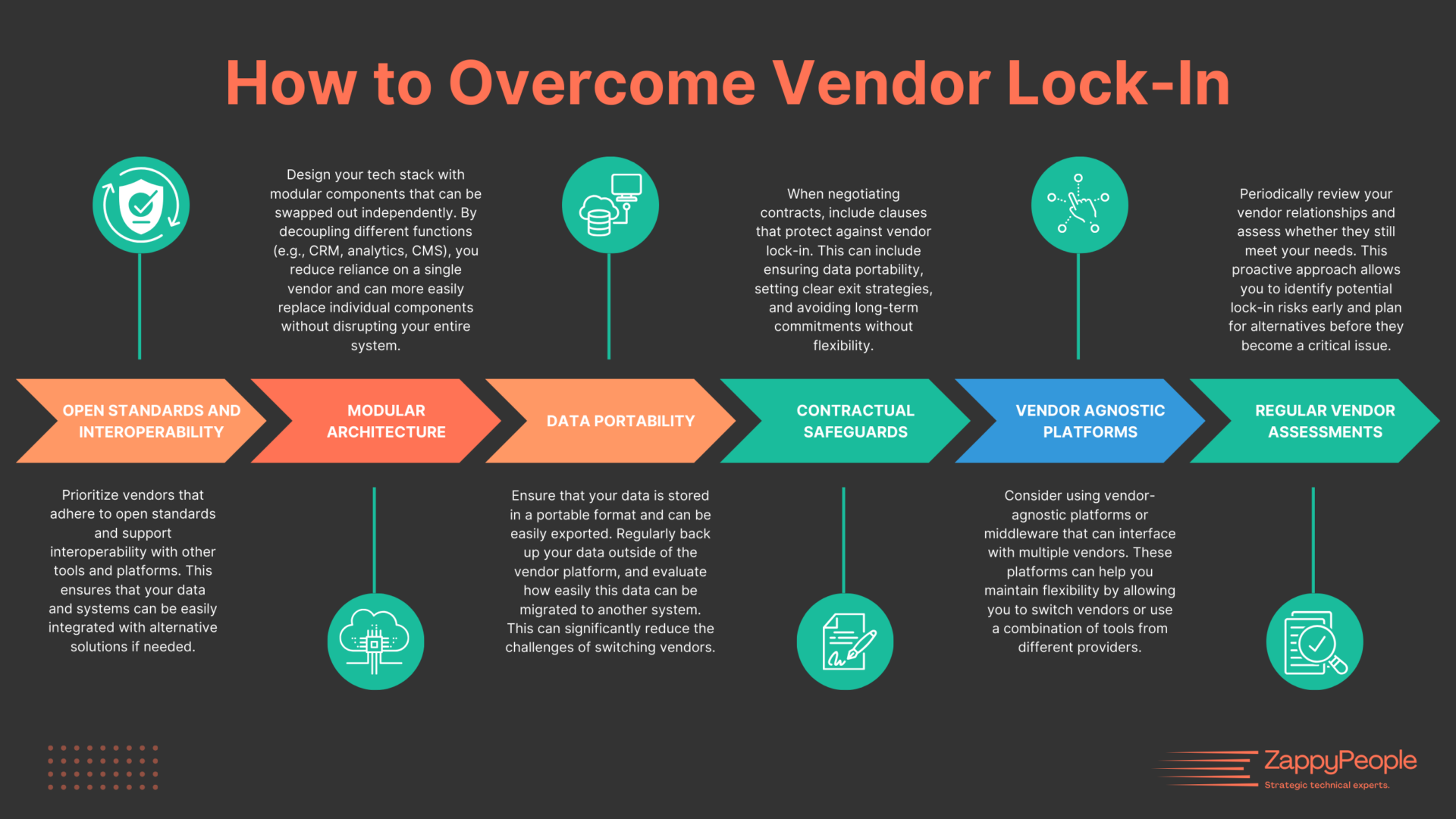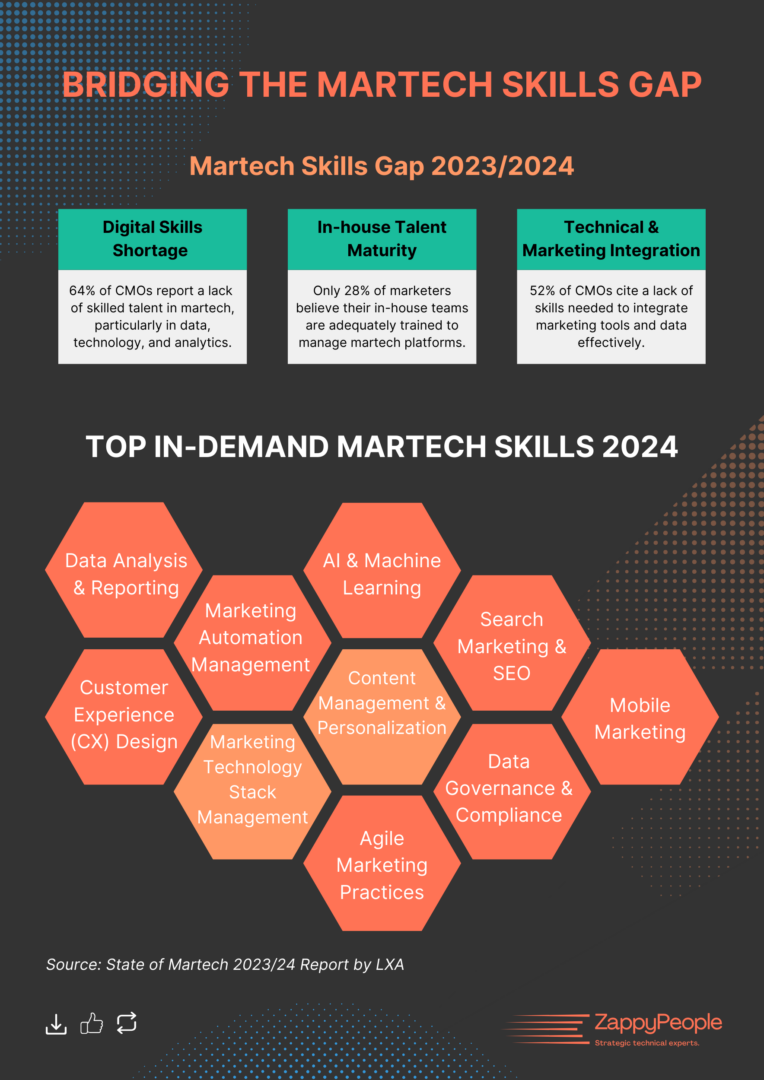Vendor lock-in and talent shortages are two of the most pressing challenges for businesses today. These issues are deeply interconnected.
Vendor lock-in restricts flexibility and innovation. Skilled talent shortages exacerbate these limitations and make it difficult for organizations to fully utilize technology investments.
In marketing technology, for organizations to remain agile and capable of driving sustainable growth, both challenges must be overcome.
Vendor Lock-In: A Persistent Problem

Vendor lock-in, the phenomenon of becoming overly reliant on a specific vendors products or services, remains a prevalent issue in martech. True partnerships should not limit flexibility, increase costs, and delay innovation.
Some statistics and Real-World Examples
A Gartner survey found 75% of organizations consolidating security vendors to simplify operations and reduce complexities. This trend underscores the circular difficulties companies face when managing multiple vendors. Vendor lock-in can be both the result and cause of integration and data migration challenges.
Additionally, 60% of organizations struggle to break free from vendor lock-in, underscoring the need for strategic planning and a flexible martech stack. [Source: Gartner, “Gartner Survey Shows Seventy-Five Percent of Organizations Are Pursuing Security Vendor Consolidation”]
Vendor lock-in is worsened by rising costs across the SaaS landscape. According to Vertice’s annual SaaS Inflation Index report, over half (53%) of all software vendors raised rates over the past 12 months. Among those that did raise prices in 2024, the average increase was 13% — well above consumer inflation.
Most major vendors hiked their prices, such as Zendesk, which raised by the 13% average, or Precoro which increased its pricing by 10%. Some were even higher, such as LinkedIn, whose customers experienced a 15% rise. [Source: SaaS Inflation Index 2024]
This upward trend in pricing intensifies the burden on organizations already struggling with vendor lock-in, making strategic planning and cost management even more crucial.
How to Overcome Vendor Lock-In
Overcoming vendor lock-in requires a strategic approach that emphasizes flexibility, planning, and long-term thinking. Here are some solutions that can help you break free from vendor dependency:
- Open Standards and Interoperability:
Prioritize vendors that adhere to open standards and support interoperability with other tools and platforms. This ensures that your data and systems can be easily integrated with alternative solutions if needed.
- Modular Architecture:
Design your tech stack with modular components that can be swapped out independently. By decoupling different functions (e.g., CRM, analytics, CMS), you reduce reliance on a single vendor and can more easily replace individual components without disrupting your entire system.
- Data Portability:
Ensure that your data is stored in a portable format and can be easily exported. Regularly back up your data outside of the vendor platform, and evaluate how easily this data can be migrated to another system. This can significantly reduce the challenges of switching vendors.
- Contractual Safeguards:
When negotiating contracts, include clauses that protect against vendor lock-in. This can include ensuring data portability, setting clear exit strategies, and avoiding long-term commitments without flexibility.
- Vendor Agnostic Platforms:
Consider using vendor-agnostic platforms or middleware that can interface with multiple vendors. These platforms can help you maintain flexibility by allowing you to switch vendors or use a combination of tools from different providers.
- Regular Vendor Assessments:
Periodically review your vendor relationships and assess whether they still meet your needs. This proactive approach allows you to identify potential lock-in risks early and plan for alternatives before they become a critical issue.

Stay agile and in control by keeping your options open. Make sure your tools work for you, not the other way around. Follow these steps to stay flexible and keep innovating without getting tied down.
Talent Shortage: A Growing Concern
The martech landscape continues to evolve at unprecedented paces. This also intensifies the effects of vendor lock-in, as organizations increasingly rely on specialized tools. This dependence, combined with the necessity for expertise in data analytics, AI, and automation, has led to a significant challenge: a talent shortage.
As martech tools become more complex and integral to business success, the lack of skilled professionals capable of navigating and optimizing these systems further complicates the issue, leaving organizations struggling to keep up with the rapid advancements in the field.
Industry Data Reveals a Growing Challenge
There is a widening skills gap in marketing technology. According to the State of Martech 2023-24 report by LXA*, many companies are struggling to align the skills within their marketing teams with the demands of the rapidly evolving martech landscape. This gap is particularly pronounced in areas such as data analytics, AI, and automation—fields now essential to modern marketing strategies. As a result, businesses are facing significant challenges in maintaining and optimizing their martech stacks.
Modern B2B marketing requires talent in critical areas like customer journey mapping, marketing attribution, and ROI measurement. These skills are crucial for driving effective marketing strategies, yet many organizations find them in short supply.
The Battle for Specialized Talent
As demand for martech professionals grows, certain skill sets are in particularly high demand:
- Data Scientists: LXA reports that data science skills are the most sought-after across all martech categories. Professionals who can analyze data and turn insights into actionable strategies are invaluable assets.
- AI Specialists: With AI transforming the marketing landscape, there’s a significant shortage of experts who can harness AI for automation and personalization. This gap is making it harder for companies to stay competitive.
- Digital Marketers with Technical Skills: The market is also in need of digital marketers who possess both creative and technical abilities. Skills like coding, data analysis, and a deep understanding of martech platforms are increasingly vital for success.
*LXA reports:
Navigating the Talent Shortage
The martech talent shortage is a complex issue, but by understanding which skills are in high demand and developing strategies to attract and retain top talent, marketing leaders can better position their organizations to succeed.
The strategies marketing leaders should focus on to navigate the talent shortage while positioning their organizations for long-term success:
- Recruit for Aptitude and Potential: While it’s ideal to hire experts with years of experience, the reality is that perfect candidates are often unavailable. Look for agile learners with foundational skills and high potential. With the right training and development, they will grow into valuable contributors.
- Always Be Networking: Don’t wait for a position to open. Actively scout and connect with talented professionals year-round. Whether it’s through LinkedIn, industry events, or user groups, building relationships with skilled individuals ahead of time gives you an edge when you’re ready to hire.
- Invest in Your Existing Team: Retaining top talent is just as critical as finding new hires. Provide growth opportunities, leadership roles, and continuous learning to ensure your team feels valued and motivated to stay.
Addressing this gap is essential for fully unlocking the potential of martech investments and staying ahead in a competitive landscape. That is why, when internal talent is scarce or budgets are constrained, outsourcing can offer a flexible, cost-effective solution.
At ZappyPeople, we specialize in providing the martech expertise you need—whether it’s managing your tech stack, implementing strategies, or driving key projects forward.
Let’s talk about how we can help bridge the gap.
Overcoming These Challenges with ZappyPeople
ZappyPeople, a performance marketing tech support company, offers a comprehensive solution to address both vendor lock-in and talent shortages.
We provide specialized services, including data management, integration, and consulting, and help organizations:
- Break free from vendor lock-in: By consolidating data and functionalities from various martech tools, ZappyPeople empowers organizations to reduce their reliance on any single vendor.
- Address talent shortages: ZappyPeople has expertise in performance marketing technology that allows organizations to focus existing talent more effectively and find qualified professionals to ramp up over time.
- Improve efficiency and ROI: Through their services, ZappyPeople can help organizations optimize their martech investments and achieve better results.
Key Takeaways
- Vendor Lock-In: Becoming overly reliant on a single vendor can limit flexibility, increase costs, and stifle innovation. Implementing strategies like open standards, modular architecture, and regular vendor assessments can help mitigate these risks.
- Talent Shortage: The martech industry is experiencing a significant skills gap, particularly in areas like data science, AI, and technical digital marketing. Addressing this shortage requires a proactive approach to attracting and retaining talent with these in-demand skills.
- ZappyPeople Solutions: ZappyPeople offers expert support to help organizations overcome both vendor lock-in and talent shortages. By consolidating data and optimizing martech tools, ZappyPeople enables businesses to enhance their efficiency, reduce dependency on single vendors, and better leverage their existing talent.
Navigating the complexities of the martech landscape requires a strategic approach.
ZappyPeople offers expert support to help you overcome vendor lock-in and talent shortages in your martech stack. As specialists in performance marketing technology, we’re here to ensure your tools and teams are optimized for success.
Schedule a free alignment call with us today, and let’s discuss how we can help you achieve your goals.




